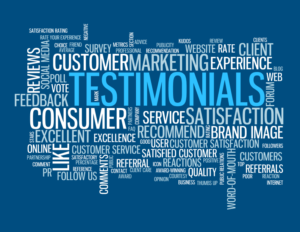One Simple Strategy to Close Up to 29% More B2B Deals
We all want to feel secure in the decisions we make. And it’s a lot easier to make a decision when you know that other people have made a similar decision and feel confident with the results. That’s why referrals and testimonials matter so much in sales. In fact, testimonials are one of the most prominent ways that C-level executives justify big decisions.
The Importance of Great Testimonials
 If ever I need to remind myself just how important testimonials are, I just think of one of my favorite apps, Yelp. Before trying any new restaurant I scope it out on Yelp. And if it gets a lot of bad reviews, I’m more than likely to eat somewhere else instead. And what do I really have to lose by going to a lackluster eatery? Less than $50 in most cases. Testimonials matter that much more in the B2B world, where deals can easily run up five-to-six figure price tags.
If ever I need to remind myself just how important testimonials are, I just think of one of my favorite apps, Yelp. Before trying any new restaurant I scope it out on Yelp. And if it gets a lot of bad reviews, I’m more than likely to eat somewhere else instead. And what do I really have to lose by going to a lackluster eatery? Less than $50 in most cases. Testimonials matter that much more in the B2B world, where deals can easily run up five-to-six figure price tags.
Speaking of monster deals, we just hosted a webinar on closing big deals. One of our presenters was sales guru Craig Elias. Craig presented some fascinating research from Sirius Decisions that revealed just how important references are to C-level executives. In fact, customer references or testimonials that a vendor provides are the single most common way that CSOs and CFOs justify buying decisions. And for CEOs it’s second (just behind previous personal experience with the company.)
As Craig revealed, referrals and testimonials are used to justify buying decisions:
- 29% of the time for CSOs
- 26% of the time for CFOs
- 24% of the time for CEOs
So what does this really mean? It means that you should be prepared to lose out on roughly one quarter of all your deals unless you’re properly armed with testimonials and references from happy customers.
How to Use Testimonials to Close Deals
Here’s a step-by-step guide to using testimonials to close more deals.
Step 1: Build up a Solid Library of Customer Testimonials
Hopefully your company has a plan in place for getting customer testimonials. At a lot of companies, customer success reps help get testimonials that salespeople can use. And as a marketer, I’ve worked with several happy customers on case studies. If this is the case at your company, try to work with customer success reps and marketers to get as many testimonials as possible.
It’s also possible you might have to ask for testimonials yourself. If this is the case, don’t be shy about asking. I had a good experience at an auto mechanic’s garage this week. He asked if I would consider giving him a review on Yelp. He didn’t ask for a “good” review. He knew he’d get one, because he could tell I was happy with the price and quality of service. And like my mechanic, you probably know who is likely to give you a good testimonial.
Step 2: Do a Testimonial Audit Before Meetings
Before taking a meeting with a C-level executive, you should do an audit of your customer testimonials, references and case studies. Try to find testimonials from similar businesses. If you have a reference from an individual that your prospect knows personally, that’s the gold standard. Short of that, a testimonial from a similar company that your prospect is aware of is still likely to be powerful. Try to identify the most applicable testimonial in advance of your meeting.
Step 3: Include the Testimonial in Your Follow-Up Email
During your meeting with the executive you can mention a happy customer or company you’ve done business with if it comes up naturally. If not, don’t sweat it. You can always include a relevant customer testimonial or case study in a follow-up email. I might include it as an afterthought at the end of the letter: “FYI just thought you might be interested in checking out what at had to say about us.”
Use customer testimonials effectively and you are almost sure to notice a big spike in closed deals. And when you start closing up to 29% more deals, don’t forget to ask your new happy customers for referrals.
For more amazingly actionable tips on how to close big deals, watch our webinar for free on demand.
